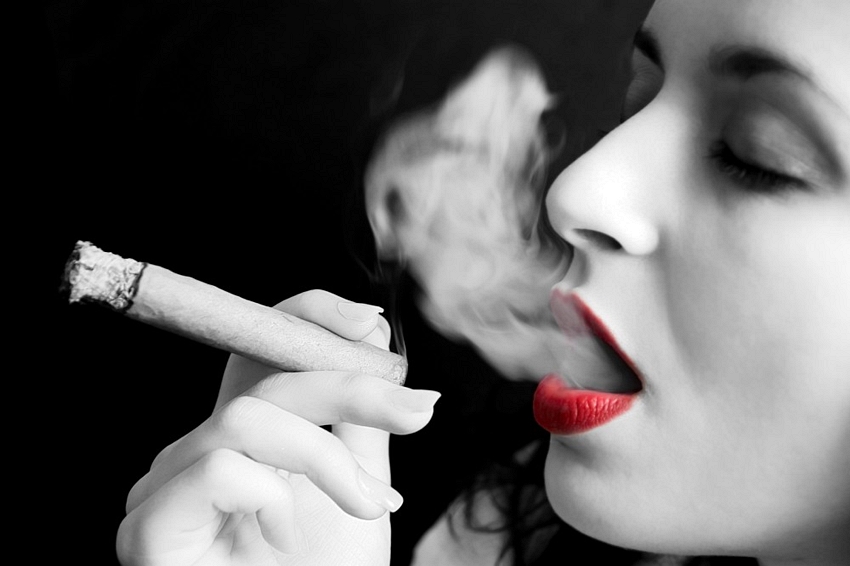 As quests for freedom go, it’s not exactly the fight against apartheid in South Africa. But cigar smokers around the country are fed up with smoking bans that prevent them from enjoying stogies in cigar bars with friends. A rising number of states have moved to exempt cigars from indoor smoking bans, often by establishing cigar bars or smoking lounges inside cigar stores. Pro-cigar groups have sprung up nationally and in most states, spreading a message that their product is fundamentally different from Chesterfield cigarettes.
As quests for freedom go, it’s not exactly the fight against apartheid in South Africa. But cigar smokers around the country are fed up with smoking bans that prevent them from enjoying stogies in cigar bars with friends. A rising number of states have moved to exempt cigars from indoor smoking bans, often by establishing cigar bars or smoking lounges inside cigar stores. Pro-cigar groups have sprung up nationally and in most states, spreading a message that their product is fundamentally different from Chesterfield cigarettes.
Cigar smokers are not interested in exposing the general public to their pungent fumes, said Joe Arundel, president of the Cigar Association of Washington. But they don’t see why they can’t smoke in the company of fellow enthusiasts – a gathering known as a “herf” in cigar circles – in businesses dedicated solely to the product.
“It’s not like people walk into a cigar store by accident,” Arundel, who operates Rain City Cigar in Seattle, said.
Washington used to have cigar bars and lounges. But a ban on all indoor smoking in 2005 put them out of business. A bill introduced in the state Legislature this year that would allow a limited number of cigar lounges and bars has languished in committee, after getting vehement opposition from the state Department of Health.
The Health Department opposes any change to the state’s indoor smoking ban, one of the nation’s first, said Tim Church, a spokesman for the agency.
“The indoor smoking law was passed by a great majority in every county in Washington state,” Church said.
The ban is intended to protect the health of non-smokers and especially of employees who work in bars and restaurants, Church said.
“We don’t like the idea of an employee having to sign away their rights to health to have a job,” Church said.
Washington has been inhospitable to smokers for years. The state was an early adopter of smoking bans in bars and restaurants, and its cigarette tax of more than $3 a pack is among the highest in the nation.
Annie Tegen of Seattle, program manager for Americans for Nonsmokers’ Rights, said they oppose any effort to weaken smoking bans.
“The public loves this law,” Tegen said. “There is no reason to weaken this law and put our workers at risk.”
The anti-smoking group Action on Smoking and Health (ASH) of Washington, D.C., said there is no legal right to smoke in the U.S., and many other countries are adopting bans on public smoking.
“The tendency is more towards protecting the health of the population, rather than exemptions,” said Laurent Huber, head of the group.
After years of victories, there are signs that anti-smoking forces are encountering some resistance. A nationwide advocate for cigar smokers said the tide seems to be turning against bans that lump cigars with cigarettes.
Kansas, Minnesota and Illinois also have pending legislation that would loosen smoking bans to allow for cigar bars, said Glynn Loope, executive director of Cigar Rights of America.
“‘Five years ago, I wouldn’t give you a $10 bet on any of these bills being drafted,” Loope said. Now some might even be passed, he said. New York, Nebraska, and Oregon are among 13 states that ban indoor smoking but allow exemptions for cigar bars, he said.
Cigars and cigarettes have fundamental differences, cigar advocates say. Premium cigars are more expensive, take longer to smoke and tend to be favored by older people. Cigar smokers don’t chain-smoke and often regard their activity as an occasional luxury to be savored with friends and a drink, Loope said.
“The cigar industry is based on art and culture, and not being abusive to the product,” Loope said. “The average cigar smoker smokes two a month.”
Cigar stores tend to attract only cigar smokers, not people who would be offended by the smoke, he said.
“These shops lose a lot of their character and soul when they can’t allow use of a perfectly legal cigar in the shop,” Loope said.
No one is forced to work in cigar shops, and several states require such employees to sign waivers indicating they understand the dangers of second-hand smoke, Loope said.
Cigar advocates see themselves as oppressed by a hypocritical majority that is obsessed with stamping out tobacco use while tolerating alcohol.
Arundel noted the bill in Washington would allow a maximum of 100 cigar bars to open across the state. By contrast, there are 5,800 liquor licenses, he said.
“Should we be any more discriminated against than anybody else?” Arundel said.
Smoking opponents would no doubt argue with that logic – after all, bartenders can’t get sick from alcohol by serving it, but an employee of a cigar bar is exposed to secondhand smoke. Nevertheless, Arundel said cigar smokers will continue to fight for cigar bars and lounges, a cause they see as standing up for the rights of private property owners.
“All we are asking for in our state is a little bit of reason and fairness,” he said.